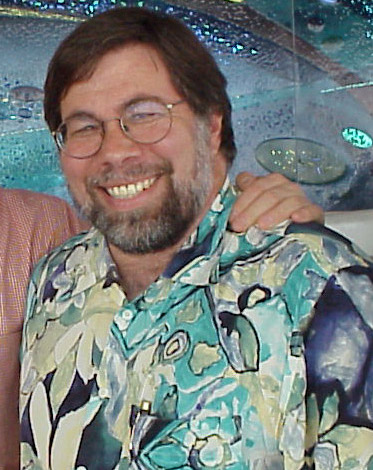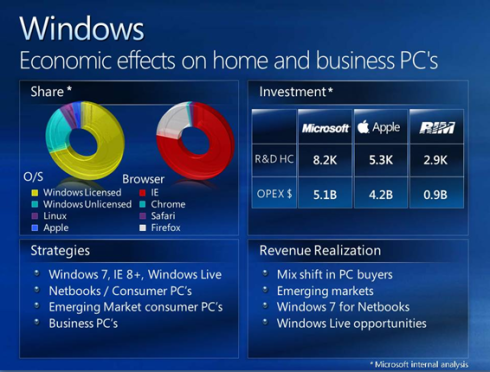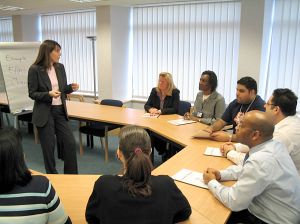12.17.10
Posted in Apple, Deals, Microsoft, Novell, Oracle, Patents at 2:47 pm by Dr. Roy Schestowitz

Summary: The real face of CPTN, the entity which got Novell’s software patents; more revelations about how Novell’s deal came about
WE HAVE written over 20 posts about the subject since Novell was sold (despite impending litigation) and it was never known to the full extent just what Novell did and where assets were being passed. First there was turmoil over the assumption that Microsoft may have acquired UNIX from Novell. Shortly after Novell was publicly flogged for it the CMO of the company came out with an important statement denying this claim (AttachMSFT [sic] might still sell UNIX though). It was still assumed at the time that CPTN was merely a Microsoft shell [1, 2, 3, 4, 5, 6, 7] as no company other than Microsoft was named as a member. Well, none until now anyway. A group of Microsoft proponents [1, 2] says that Apple, Oracle and EMC are also part of CPTN (not principal ones though) and Groklaw theorises that it’s ill-intended and dangerous to Linux. From its new post on the subject:
So what’s the common interest? “Let’s all kill Android”? There’s a limit on that, in that Google is also an Open Invention Network member, so it has a license to these Novell patents already. Of course there could be more than one theme, virtualization, office suites.
Don’t forget that if you sign up with Open Invention Network before this deal closes, you will have a license in perpetuity to all those patents, and more, and these Machiavellian dudes won’t be able to mess with you. Here’s the article that provides information on where to sign up and who qualifies and what is required.
By the way, Oracle is a member of OIN, so it knows how it works. If it wanted to prevent patent litigation, all it had to do was buy all the patents. So I will assume they plan to use these patents, claiming they belong to the consortium and are therefore not donated to the OIN pool. Alternatively, looking at matters more positively, perhaps it wished to exercise some control over what Microsoft does with the patents.
Groklaw also thinks it’s an anti-Android plot despite the fact that VMware recently released software for Android and all we know about Oracle-Apple is not a sufficiently strong link [1, 2, 3, 4]. Moreover, Oracle has too much to lose if it harms Linux (Solaris notwithstanding). Groklaw is very familiar with the SCOracle [sic] case, which it has been tracking quite closely so far, so Groklaw’s opinion is nothing to sneeze at. From the latest status report at Groklaw:
The Oracle v. Google Java litigation now begins in earnest, with each side offering a proposed protective order, along with a handy table of the disputed provisions. Say, I think Groklaw has a claim for prior art on that kind of table.
Could some rival of Android have motivated Oracle to sue? It’s not possible to tell with any conviction at this moment. The same goes for the Traul Allen case from Interval — a case that was dismissed [1, 2] but Groklaw declared the end of it before it was over for good. By the way, the MSBBC’s coverage of this dismissal was atrocious, as expected. It even glamourised Traul Allen for this pathological, irrational, antisocial behaviour.
In addition to the news about CPTN, there is also news from the VAR Guy, who sheds lights on what exactly was going on behind the scenes when Novell looked for buyers:
Overall, Novell representatives contacted 52 potential buyers. Roughly nine official bidders emerged. So how did Attachmate wind up buying the bulk of Novell’s assets? And what happened to rumored SUSE Linux bids from VMware? In a preliminary proxy statement dated December 14, Novell offers an extensive time line describing how the company’s board of directors, executive team, and external financial advisors pursued potential buyers for the company. The filing is more than 100 pages. Here are some of the highlights, paraphrased by The VAR Guy. Please note:
* The vast majority of the info below is based on information within Novell’s SEC filing.
* Novell protects the names of several bidders, referring to them as Party A through Party E. In some cases, The VAR Guy makes some educated guesses about the actual identity of each company. But The VAR Guy’s educated guesses could be wrong.
Regarding anti-Android lawsuits, Mac Asay [sic] wrote this new article where he claims the lawsuit are evidence of Linux and open source success (it is embedded in almost everything).
Google came up with two on its own – Android and Chrome OS – to cover its bases on encouraging geeks to contribute to Google’s total world domination. And while Chrome OS never quite got out the gate in 2010, despite assurances that it would ship in late fall, Android more than made up for Chrome OS’ delays, with Google’s Andy Rubin tweeting: “There are over 300,000 Android phones activated each day.”
That’s a heck of a lot of phones running open source. Even more than Apple ships.
Apple, of course, didn’t let this open-source momentum go unnoticed, and launched a lawsuit against Google’s Android through its licensee, HTC. Not to be outdone, Microsoft and Oracle also sent lawyers to the Googleplex. About the only company that didn’t is Research in Motion. Nice Canadians.
Not only Linux is a target of such mobile phone lawsuits. There are more new lawsuits right now and they come from Symbian giant Nokia to apply pressure on Apple:
Nokia has just released a press release announcing that it has filed claims in the UK, Germany and Holland, alleging that Apple has infringed on Nokia products sold in those respective countries in regards to technologies used it the iPhone, iPad and iPod Touch.
In response, writes Rupert Goodwins (UK-based journalist): “I find this profoundly depressing. Does history mean nothing in the face of short-term reactive capitalism?
The patent lawyers are watching this carefully (still afraid of losing software patents) and TechDirt jokes that creating flight plans on the Internet is now patented. Hilarious! Sane judges can view this as further evidence of BM/SW patents needing abolition.
Thanks to Kiran Lightpaw for alerting us to yet another example of patents being used to stifle innovation, rather than enable it. It involves a company called FlightPrep, that secured a patent (7,640,098) a year ago, covering generating a flight plan online and filing it online. Basically, it’s one of your typical “just add online and patent it!” patents that never should have been granted. In fact, the patent, which was first applied for in 2001 was rejected repeatedly, and many adjustments had to be made before the patent examiner finally gave them the patent.
Once they got the patent, they apparently started hitting up all sorts of online flightplan services for licenses — even ones that appear to have been online predating some of the claims in their patent. Nelson Minar, who knows more than a little bit about software development, does a nice job highlighting that there appears to be a fair bit of prior art to the claims that were actually approved.
Free software would have won far more easily if there were no software patents, which cannot be justified on economic grounds anyway. Everyone needs to demand elimination of software patents to hasten development and research efforts. Patents help society as much as Wall Street does. █
Permalink
 Send this to a friend
Send this to a friend
12.15.10
Posted in Apple, GNU/Linux, Google, Novell at 7:12 am by Dr. Roy Schestowitz

Summary: Novell ignores Symbian and Android users and instead just services hypePhone [sic] users due to “customer demand”
WHAT A BLUNDER. Despite that fact that Android phone activations roughly equate or outpace those of hypePhone, Novell brings Fog Computing control to Apple products like hypePhone but not Linux-based phones which include Android. IDG inquired to get this explanation: “Ben Grubin, director of data center management for Novell, told Network World that the remote management application might appear on other mobile platforms, such as BlackBerry, Android, and Windows 7, if there is sufficient customer demand.”
Well, fine then. So based on the news around IWM — including a press release — Novell continues to market proprietary software, its roadmap shows no signs of change, and it’s mostly about marketing (new brand name for old products) and bribes-for ‘studies’ which are being used for marketing. On top of it all, IWM only services people whose phones run the most locked-down, proprietary operating system and snubs the leading mobile operating systems which are free/open source software, notably Symbian and Android. Shame on Novell for pretending to be a friend of “open source”. In a later post we’ll show how it uses its patents against “open source”, which makes it more like a foe than a friend. The video segment below springs to mind. Novell’s commitment to software freedom is virtually non-existent. █
Permalink
 Send this to a friend
Send this to a friend
12.13.10
Posted in Apple, GNU/Linux, Microsoft at 8:21 am by Dr. Roy Schestowitz

Summary: Apple’s patent armament is increasing and Wozniak, who recently defended a patent troll from Microsoft, says “we’ve lost a lot of control”
Apple’s co-founder Steve Wozniak says “we’ve lost a lot of control” and he is right. “I didn’t design this computer to make a lot of money,” Wozniak claims despite being an apologist for Traul Allen. Many pundits have pointed out that Apple blew it some decades ago by demanding too much and firming up its grip. It is the sin of Hubris. Apple is doing it again.
Recently we learned that Apple was preparing to sue Motorola — not just HTC — for its hugely popular Linux-powered Android phones. Motorola sued first (allegedly only after a situation similar to Nokia's) and Apple is piling up the patents right now. Apple Insider says that Apple adds 12 more patents to lawsuit against Motorola and Slashgear says is it a “42 patent litigation action” (combining Motorola and HTC).
Holy crap look at all of that legal battle logistic mapping. This is a simplified view of the battles Apple has currently waged against Android phone manufacturers Motorola and HTC. Seems simple, doesn’t it? This is a collection of cases that, with any luck, will be completed in oh, a decade?
For those who do not remember, Apple also invested in Intellectual Ventures, which is suing right now [1, 2]. Previously, Intellectual Ventures gave patents for another firm (also a patent troll) to sue over mobile phones.
Mike Masnick offers background to some of it, having covered the topic quite a lot in the past.
For years, Intellectual Ventures has avoided suing companies directly, while building up a portfolio of tens of thousands of patents (mostly bought — though it likes to get PR from the wacky and usually useless patents it files directly). Its business model, to date, has been about shaking down giant tech companies for hundreds of millions of dollars in exchange for letting those companies use IV’s patent portfolio either defensively or offensively against others. However, as part of an attempt to avoid the dreaded “troll” label, the company had avoided suing others directly for quite some time — though, it’s always hinted that it would eventually. About a year ago, we started to see IV patents showing up in lawsuits, but they had been licensed to other companies first. The notoriously secretive company would never comment on whether or not it had any stake in the results of such lawsuits.
Microsoft helped create Intellectual Ventures because it knew there would be many patent trolls. Intellectual Ventures was supposed to be Microsoft’s solution, but it is not exactly helping because Microsoft has over 50 patent lawsuits against it (at least a year ago). Apple has a similar problem. Some hope that Microsoft and Apple will be sued to the point where they decide that it’s better to just withdraw software patents.
“RCT Expands Patentability for Software” says this new article about RCT vs. Microsoft.
Thankfully, the Federal Circuit is bringing normalcy back to recent statutory subject matter debates for software and business methods in view of Bilski. As we predicted, the case of RCT v. Microsoft is the first case in which the Federal Circuit has spoken substantively about the Supreme Court’s Bilski decision, and the bar of “abstract idea” invalidity has been raised back closer to where it was for the last 10 years after State Street.
The court noted that the Supreme Court, as was urged in AwakenIP’s Amicus Brief, “did not presume to provide a rigid formula or definition for abstractness,” thus “With that guidance, this court also will not presume to define ‘abstract’ beyond the recognition that this disqualifying characteristic should exhibit itself so manifestly as to override the broad statutory categories of eligible subject matter and the statutory context that directs primary attention on the patentability criteria of the rest of the Patent Act.”
Groklaw’s Pamela Jones remarks: “That’s one way to look at it. Another way is to view it that the Federal Circuit can’t seem to get with the Supreme Court’s direction, which is why it keeps knocking them on the head.” There is hope that the i4i case may change this. There is only one party that always — without any exceptions — wins here and that’s patent lawyers. █
Permalink
 Send this to a friend
Send this to a friend
12.04.10
Posted in Apple, GNU/Linux, Google, Microsoft, Patents at 7:31 am by Dr. Roy Schestowitz

Summary: As more desks are being emptied or vacated owing to portability, it is portable devices that GNU/Linux needs to target; software patents are Apple’s and Microsoft’s only viable response
PHONES (featurephones or smartphones) are a growth area which is further complemented by mobile devices like tablets. This comes at the expense of the so-called ‘desktop’ to a certain extent. Microsoft knows this and even admits this sometimes. Vista 7 is not suitable for such devices and Microsoft is unable to make Vista Phony 7 [sic] stick (the company needs it for form factors like tablets). In such a situation Microsoft can just give up, acquire a winning team, or try again to leapfrog the competition with a new product. But instead, Microsoft is extorting for products it does not make to pay up, in order to serve as a sort of corporate welfare. A mobile technology news site says in the headline that “Microsoft sees revenue potential in smartphone-related patents” and this claim sometimes comes from Microsoft’s own mouth. Rupert Murdoch’s AllThingsD has another opinion: “Microsoft’s top lawyer, Brad Smith, said the company’s road to success in mobile isn’t based solely on its Windows Phone 7 operating system. According to AllThingsD, Smith said the company also believes it can make money from its vast pool of smartphone-related patents. However, he conceded that the money Microsoft could make per phone from patents isn’t as much as it could get via sales of phones running Microsoft software.”
According to news that we pinned down yesterday, most the phones sold in China are now running Linux (Android) and despite its loyalty to client like Microsoft, the Gartner Group acknowledges that Microsoft’s bread and butter gradually recede [1, 2, 3]. “Tablets putting a drag on PC sales” is one way of putting it and clearly enough Gartner is trying to bury its false predictions (there are many):
-
TABLET AND SMARTPHONE sales are thought to be behind lower than expected growth in PC shipments, according to Gartner.
The IT market research firm is now expecting a 14.3 per cent increase in PC shipments in 2010 over 2009, down from a prediction it made in September that the year would see 17.9 per cent growth. Gartner views tablet and smartphone sales as reasons for that and the company expects tablets to grab 10 per cent of the PC market by 2014.
A few hours ago we showed that Apple — like Microsoft — resorted to using software patents against mobile Linux, which is self explanatory.
-
I’ve said this before but if you feel the best way to promote your product is to attack the opposition you have already lost. Fear uncertainty and doubt (FUD) is a well known tactic and exists not only in the software world. Free software supporters have been quoting Ghandi’s “ignore, ridicule, fight, win” quote for a long time. By launching these attacks both Microsoft and Jobs appear to have belied their fear of the rival product and aligned themselves with step 3 of that process. Despite the rhetoric that came from Redmond and Apple supporters following these stories, the truth is that both OpenOffice.org and Android have made big enough dents in their markets to wake up the sleeping giant monopolists.
The latter post from Ryan Cartwright is as optimistic as it ought to be. Linux is in many ways winning, but it is not known as “Linux”. Just as “Linux” stole GNU’s thunder, brand names like Android and Ubuntu are now stealing Linux’ thunder. Articles by Joab Jackson and others make it clear that Microsoft is now focused on patents, not products.
The software giant filed a patent yesterday, in which it proposes to deploy a layer of shape-memory plastic that would change the surface of the screen when hit with different wavelengths of ultraviolet light.
Microsoft wishes to become a so-called “licensing company” (euphemism for patent taxation centre) because it cannot grow past the desktop, which seems like a shrinking market. GNU/Linux need not aspire to take over the desktop if the desktop itself (as we know it today) is quickly changing with advances in nano-technology.
Paul Grim explained a month ago “Why Apple can’t beat Android” either:
For the better part of 20 years, Mac lovers fumed in frustration as Apple languished in sub-5% PC market share territory. Wintel dominated. Big, ugly, buggy, clunky, and everywhere. It seemed as if graphic designers were the only people stubbornly refusing to admit defeat and join the rest of the planet in using Windows.
Gerard Braad, an amicable mobile Linux developer who was recently elected for Fedora leadership, says that “Oracle and #TheSteve [Job] couldn’t keep the promise yet, but Henri Gomez made [...] #OpenJDK on #OSX http://blog.hgomez.net/?p=670″
On the desktop too GNU/Linux is said to have greater market share than Apple’s (see Ballmer’s slide below). The world is bigger than the United States, but last week a lot of Web sites were referencing the bunk from Net Applications. █
 f
f
Permalink
 Send this to a friend
Send this to a friend
Posted in Apple, GNU/Linux, Patents at 4:22 am by Dr. Roy Schestowitz

Summary: Apple is not just barking at Linux phone makers (e.g. Palm) but it is also biting by suing and increasing the magnitude of existing lawsuits against the likes of Motorola (Android)
THE threat of Apple is not just a threat to software freedom (as last explained late at night); it is a threat to fair competition and it’s a distortion of the market. Watch the “Business Idea” comic and remember that Apple — by its own admission — is just taking other people’s ideas. A few nights ago we did a special episode on software patents and mentioned Apple for its role in this too. Apple is suing to embargo Linux-based phones/phone makers, using software patents to generally remove competition or remove features from competitors’ products. “Apple Lawyers Up for Patent Showdowns With Nokia” says this new headline from BusinessWeek and it’s not the only patent war where Apple increases its level of ammunition to exclude rivals from the mobile market (some are using the Linux-powered Android). As a reminder, Apple is said to have signaled that it would sue Nokia and Motorola.
Steve Jobs made Apple Inc.’s iPhone one of the best-selling smartphones on the market with its touch screen, fast Web connection and access to more than 300,000 downloadable applications. Now he’s adding lawyers to the mix.
Apple is squaring off this week against Nokia Oyj, the world’s largest mobile-phone maker, before the International Trade Commission. The dispute, in which each side alleges intellectual property violations, is also a precursor to Apple patent battles with Motorola Inc. and HTC Corp.
Apple is going further than patents and it can easily be shown that it is more of a thug than people realise. “Apple Forces Removal Of Steve Jobs Action Figure,” shows TechDirt, which speaks about a cult item:
A Chinese company, MIC Gadget, got some attention for its Steve Jobs figurine but some of that attention came from Apple’s lawyers, who forced the company to stop selling the item.
“I didn’t know that Apple owns Steve Jobs,” said gnufreex in our IRC channels. “Thought it is other way around” (to them, he is a marketing tool, just like Bill Gates is to Microsoft).
“Apple Gets Partial Win in Case Alleging Copyright Infringement by iPhone App,” says Eric Goldman:
Martyn Stewart recorded a bunch of nature sounds, including bird sounds, which a third party developer allegedly incorporated into the “iBird” app. Stewart sued the developer and, predictably, sued Apple as well.
Separately, Apple is stacking up more patents. One report says that “[i]n March, inventor Timothy R. Pryor assigned his interest in three patents and 10 patent applications covering methods for interacting with automobile telematics equipment and home appliances over to Apple.”
“Apple Wins Patent for Glasses-Free 3-D TV” says this other report (one among more).
3-D TV–a fad or the future? Apple’s vote is for “future”. The company’s just won a patent on a glasses-free 3-D TV system that’s so advanced it sounds like sci-fi. And not necessarily in a good way.
Apple applied for this patent back in 2006, but unlike much of the patent speculation that surrounds one of the world’s most successful (and most sued) companies, this one has just been granted by the USPTO.
Apple would lie about using patents defensively; clearly that’s not the case. The only “defensive” thing about its stance is that it defends its shareholders’ bank accounts. █
Permalink
 Send this to a friend
Send this to a friend
12.03.10
Posted in Apple, GNU/Linux at 5:05 pm by Dr. Roy Schestowitz

Joe Lieberman: The man who tries to shut down Wikileaks
Summary: Apple is shutting out Linux content, breeds “fundamentalists”, mistreats employees, and basically repels even some of its own customers who are increasingly fed up (but locked in)
Microsoft is scared of Linux and Apple is nervous about Linux too. “Apple bans Android magazine app” says this CNN headline:
Tuesday seems to have been Apple’s (AAPL) day for saying “No.”
First Apple Legal ordered the Chinese manufacturer of a Steve Jobs look-alike doll to stop making the popular action figure.
Then a representative from developer relations informed the CEO of Mediaprovider, a small magazine publisher based in Denmark, that he couldn’t put a magazine about Google’s (GOOG) Android on the App Store.
Jan Vermeulen’s news piece found a clever game with strong words (iHorse and “fundamentalists”) which he put in the South African press without the editor’s objection:
When you try to challenge that statement with something like, “You do know that Apple didn’t invent multi-touch, right?” you’re often greeted with the fallacious rebuttal: “Yes, but they *popularised* it.”
In a misguided attempt to bring some balance to this argument I will unfortunately not be able to do a full review of the history of the smartphone, so let’s begin with the multi-touch driven interface Apple announced so proudly that it had invented.
Even those so-called ‘fundamentalists’ who serve Apple turn out to be “disgruntled” based on an Apple “cult” site (CultofMac). We have already heard of an Apple employee whose life in Florida was ruined by Apple and now comes the following from a pro-Apple site:
The complaints touted on the blog range from the size of repair parts packaging to things like brain-washing and drinking the Apple Kool-Aid. It just goes to show you that you cannot make everyone happy.
Consider the complaint about the size of boxes for packaging repair parts. It might be better to have a one size fits all approach vs. having a handful of different size boxes around that you might never use.
“How I Learned to Stop Worrying and Love Canonical” is another new post which warns about Apple:
Steve Jobs is a master of controlling the conversation, and he has attempted to reframe the “open vs. closed” debate into “integrated vs. fragmented“. There can be no doubt that his “integrated” approach has proven very profitable for Apple (poised to become the most valuable company on the planet this year, passing Exxon) but I don’t believe that his methods are ultimately sustainable.
Microsoft is turning into somewhat of a patent troll while Apple is proving to be another headache that cannot be ignored. Little by little Apple teaches people to give up their rights and their freedom. █
“FSF did some anti-Apple campaigns too. Personally I worry more about Apple because they have user loyalty; Microsoft doesn’t.”
–Bradley M. Kuhn (SFLC)
Permalink
 Send this to a friend
Send this to a friend
12.02.10
Posted in Apple, GNU/Linux, Microsoft, Mono, Novell, Ubuntu at 6:29 pm by Dr. Roy Schestowitz
Music Player Mistakes in Ubuntu

Summary: Insertion of Mono-based software like Banshee endangers Ubuntu as it makes the parent company more reliant on Microsoft and more sensitive to Microsoft extortion
“In the upcoming version of Ubuntu (11.04 Natty Narwhal), Banshee will be replacing Rhythmbox as the default music player,” says this new post. It is hopefully not true. It was not final at the time we last wrote about it and this candidate Mono trap was mentioned for its approach towards Ubuntu in previous posts, including:
Canonical would make a massive mistake by picking a project which is maintained by AttachMSFT (assuming it keeps the project alive at all). The project is also known to be using libraries which are clearly excluded from the MCP, which means that Microsoft reserves the right to sue. Over at Miguel de Icaza’s Web log it is made clearer this week that he drifts further away from GNU/Linux and Free software [1, 2] and instead boosts Microsoft software like Mono and Moonlight. Will he even stick around at AttachMSFT, which is supposed to be his new employer? The Moonlight project is still delusional enough to run after a project that Microsoft has just axed, only to pretend to be compensating developers whom it stabbed in the back as Microsoft’s booster Gavin Clarke reports:
Microsoft has promised a keynote from the chief geek synonymous with Silverlight, vice president for the .Net developer platform Scott Guthrie, who’ll talk about what’s in the next version. There will be training in Microsoft’s media player from program manager Tim Heuer, among others, and there will be schwag — ‘cos Microsoft knows how we lurve schwag.
Yes, it’s all here: practical advice, vision to keep us on the rails, and freebies. It’s perfect. Almost too perfect — as if Microsoft is trying too hard, like that absent parent who walked out on the kids and who now shows up at Christmas loaded with presents.
Speaking of Christmas presents, in the next post we’ll show that Microsoft fails to sell much gear this season. The company is declining quite rapidly and the worst one can do is rely on its software. So why again is Ubuntu adopting Banshee despite Novell’s death and the continued demise of Microsoft? █
Permalink
 Send this to a friend
Send this to a friend
11.27.10
Posted in Apple, DRM at 7:51 am by Dr. Roy Schestowitz

Summary: Links to news about Apple
• Wipeout: When Your Company Kills Your iPhone [via] (recall the 1984 Amazon incident)
A few weeks ago, Amanda Stanton’s iPhone suddenly went black.
She had been talking on it and navigating with a GPS app during a work trip to Los Angeles. Then, without any warning or error message, the phone quit.
Everything was gone — all her contacts, photos and even the phone’s ability to make calls.
It was only after she got home to Silicon Valley that she found out that her phone had been killed by her employer, a publishing company.
• Issuu Gives Up on App Store After Three Rejections
Issuu, a popular document sharing service that may have provided some competition for Apple’s planned digital newsstand, has abandoned plans to release an iOS app after Apple rejected the company three times. The New York-based firm isn’t divulging many details, but hinted in its blog that its openness was the cause of its rejection by Apple. “Based on the latest rejection, we don’t think it’s realistic that we can get it approved,” Issuu co-founder and spokesman Martin Ferro-Thomsen told me in an interview. ”We would have to make some changes we’re not comfortable with. We would have to restrict the community more than we’d like to. It’s really a sad day for us, because we love Apple, but it’s their platform and App Store, and we just live in it.”
• The App Store model faces disruption from HTML5
Today’s Wall Street Journal features an article by Christopher Lawton that talks about the difficulty independent app stores face when competing with Apple and Google for developer and consumer attention. Paul Reddick, chief executive of third-party app store HandMark told WSJ that he couldn’t simply bet the whole company’s fate on independently distributing apps with a presence like Google to compete against.
It may not even be a prudent bet to be in the app store business at all.
SPIL Games, a Dutch company that built its audience of more than 130 million gamers on browser-based Flash games, has found that the behavior of casual gamers doesn’t translate well to the app-based distribution model.
• Apple – The Competent Danger to Free Software – Part Two
A while back I wrote an article titled Apple – The Competent Danger to Free Software. It got a lot of hits. It also caused a few people to send me emails, one of which called me a traitor to Free Software.
The problem that everyone ignores, is that if you are a musician, you haven’t really got a lot of choice. Apple’s products are the best available for musicians. Sure, there’s some software available for the Windows platform, but really it’s not all that good. There’s some software available for Linux too, but it’s limited.
“We’ve always been shameless about stealing great ideas.”
–Steve Jobs, Apple
Permalink
 Send this to a friend
Send this to a friend
« Previous Page — « Previous entries « Previous Page · Next Page » Next entries » — Next Page »


























 Content is available under CC-BY-SA
Content is available under CC-BY-SA